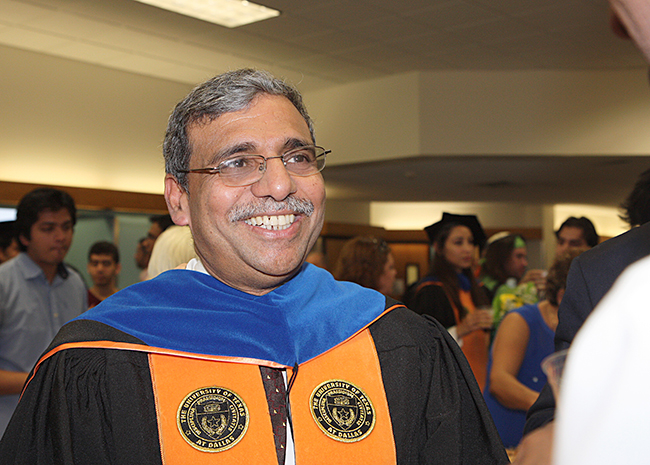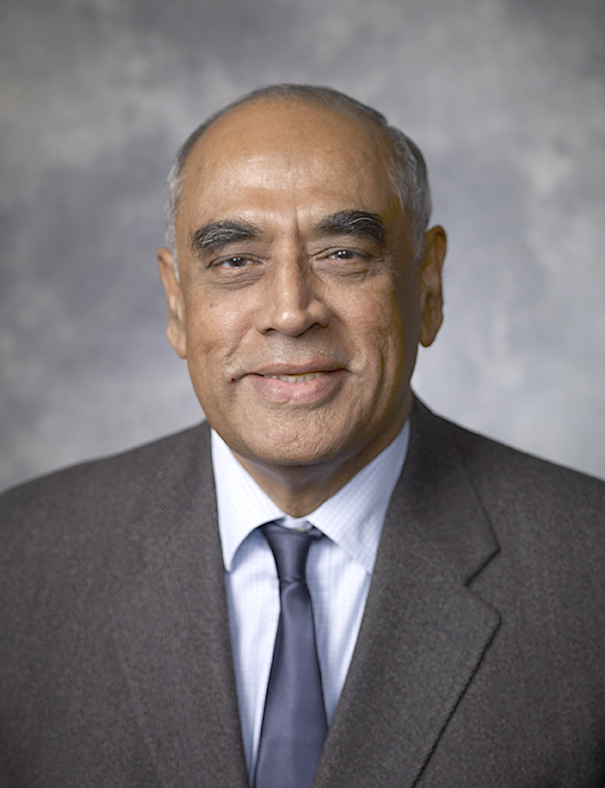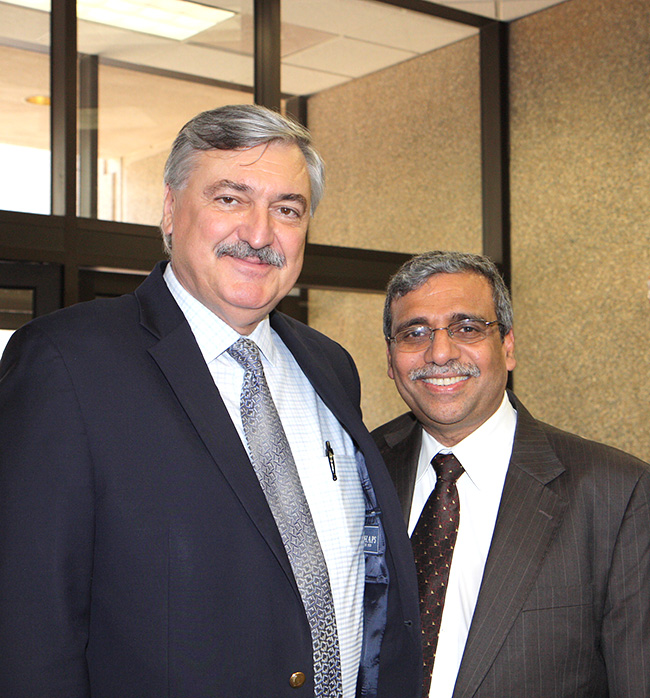
Dr. Dipak Jain's acceptance into a UT Dallas management science doctoral program in 1983 was the first step in a distinguished academic career.
It’s been 31 years since Dr. Dipak Jain received a letter from UT Dallas accepting him into a management science doctoral program 8,000 miles away from home.
The letter was unexpected. Jain had not been able to provide requested GMAT scores because access to the test was difficult from where he lived in India.
“Honestly, I come from such a remote part of India, and I had never heard the letters G-M-A-T,” he said during a speech at a doctoral hooding ceremony Aug. 15.
But Jain’s transcripts and letters of recommendation had impressed Dr. Ramaswamy Chandrasekaran, who taught in the program and is now an Ashbel Smith Professor of computer science and operations research.
“He took a leap of faith and sent me a letter of admission with full financial aid,” Jain said.
That letter was the first step in a distinguished academic career. After earning his PhD, the Naveen Jindal School of Management graduate began his teaching career at the Kellogg School of Management at Northwestern University in 1986. He served as dean there from 2001 to 2009. In 2010, he was named dean of INSEAD, an international graduate business school based in France. He stepped down and returned to teaching earlier this year for health reasons.

JSOM Professor Dr. Ramaswamy Chandrasekaran received words of gratitude from his former student.
Jain entered the UT Dallas PhD program in 1983 and studied under Dr. Frank M. Bass, one of the founders of marketing science. Bass, who died in 2006, developed mathematical and statistical models to answer marketing questions. Bass and Dr. Ram Rao, a Founders Professor who teaches marketing, co-chaired Jain’s dissertation committee.
At UT Dallas, Jain used his mathematics and statistical training to build an expertise in market segmentation and competitive market structure analysis and forecasting models.
Jain studied diffusion theory, the process of how consumers accept new products or ideas, introduced by Bass, said Dr. Hasan Pirkul, dean of the Jindal School and Caruth Chair.
“He’s one that I have always listened to, read about, read his writings and tried to learn because in addition to being a distinguished academic, he’s also a distinguished dean,” Pirkul said at the hooding ceremony.
Dr. Shun-Chen Niu, a professor of operations management who taught when Jain was a student, remembers Jain as a persistent researcher who did not give up on tough problems. He said Jain taught courses as a PhD student.
“His small office was always jammed with students,” Niu said. “That is, he was extremely popular with students. He has a great passion for teaching.”

Dr. Hasan Pirkul (left), dean of the Naveen Jindal School of Management, welcomes Dr. Dipak Jain to UT Dallas.
Jain has received numerous honors for his teaching and research. He is author of three books and 60 articles and has served in editing roles for leading marketing academic journals, including Marketing Science, which Bass co-founded.
In 2003, he was appointed as foreign affairs advisor to the prime minister of Thailand and has served as a consultant and a director of major corporations.
Jain left the INSEAD dean post in March to focus on teaching. He had to cancel a graduation speaking engagement at UT Dallas last year as he underwent treatment for a brain tumor.
“I wanted an appointment with God. He refused and said, ‘You still have to be a graduation speaker at UT Dallas,’” he said. “So I’m here.”
Jain said his health is now excellent. In his speech to the newly hooded PhDs, Jain described how his UT Dallas professors went out of their way to help him. There was Chandrasekaran’s “leap of faith” by accepting him. The professor also arranged a ride from the airport and provided him a place to stay when he first arrived to Texas. And there was Bass’ patience when he turned in a hand-written dissertation, which he later hired someone to type.
Jain said the mentoring and other support made it possible to meet the inevitable challenges he faced along the way. Even criticism helped him succeed as he embarked on his academic career.
“Many students say the world is so big, how can I make a difference? To the world, you may be a person, but to a person, you may be the world.”
Dr. Dipak Jain
He said that when he first began teaching at Kellogg, three students came to his office to give him some feedback after the first week of class.
“They said, 'We met and it seems you don’t know the subject,'” he said. One of them said that Dr. Jain had not taught anything beyond the assigned reading.
“He said, 'You basically read the first two chapters of the book – but you read it very well,'” Jain said. “What he said was absolutely true.”
He said the students made it clear they had not come to complain.
“They said, ‘We all believe there is a great teacher in you and this evening is our promise we will make it happen,’” Jain said.
Jain said that his experiences have taught him something: “No challenge is greater than the force behind you.” He told the graduates: “On behalf of the UT Dallas community, we are behind you.”
Jain repeated an inspirational quote: “Many students say the world is so big, how can I make a difference? To the world, you may be a person, but to a person, you may be the world.”
Then he made a gesture to the person who had opened up his world with a letter, which he still keeps.
“The person who is the world for me is Chandrasekaran.”
“Give him a hand,” Jain said, motioning to Chandresekaran as the audience applauded.